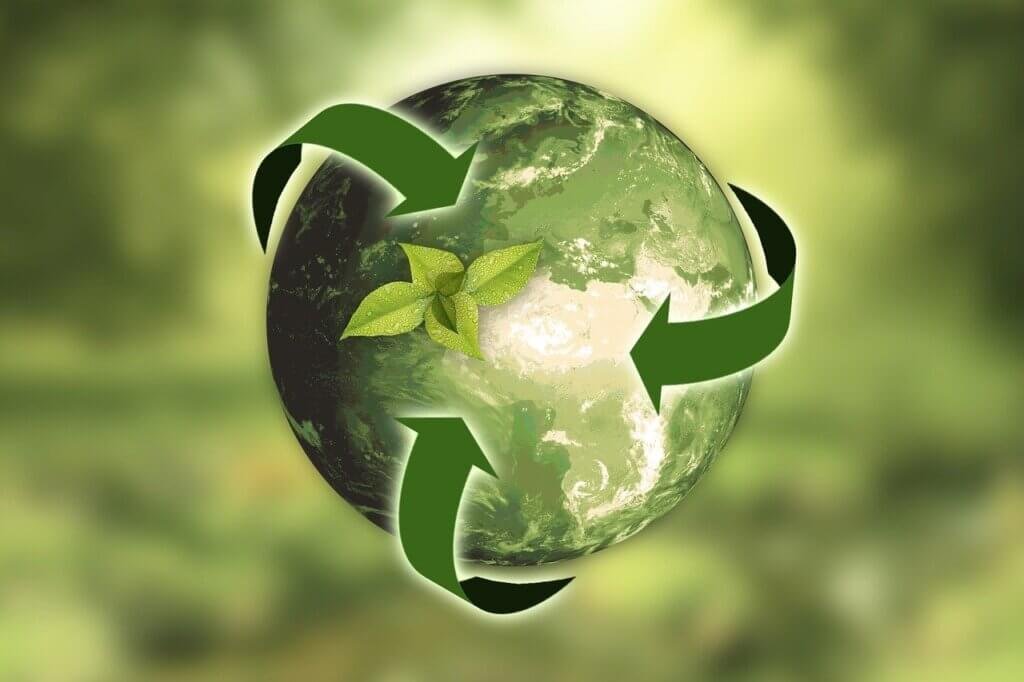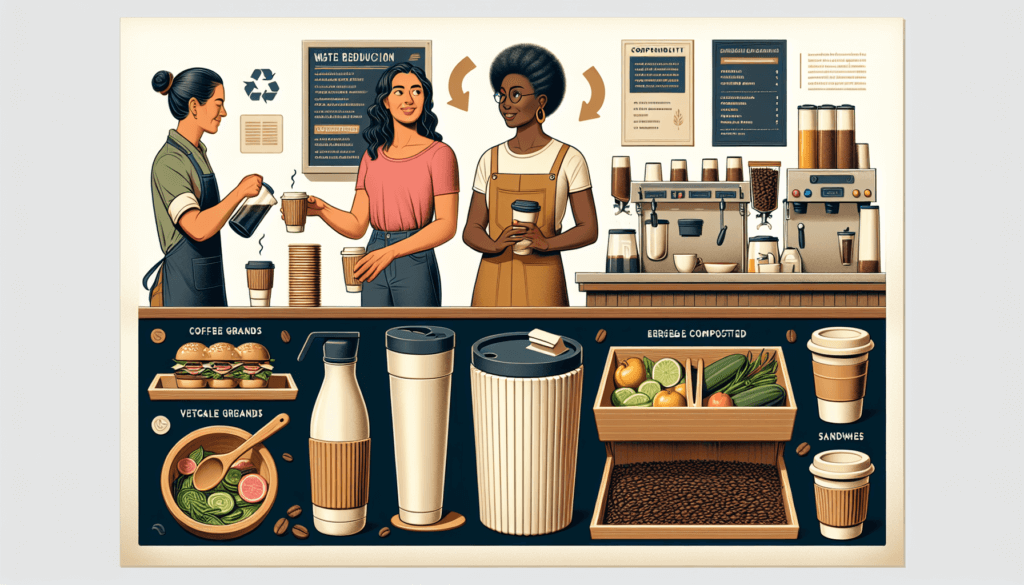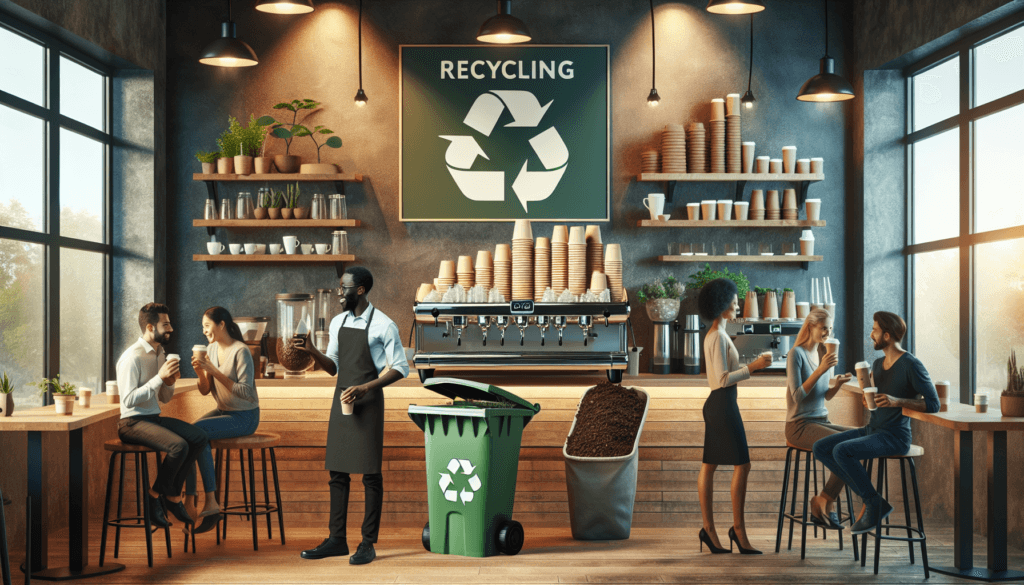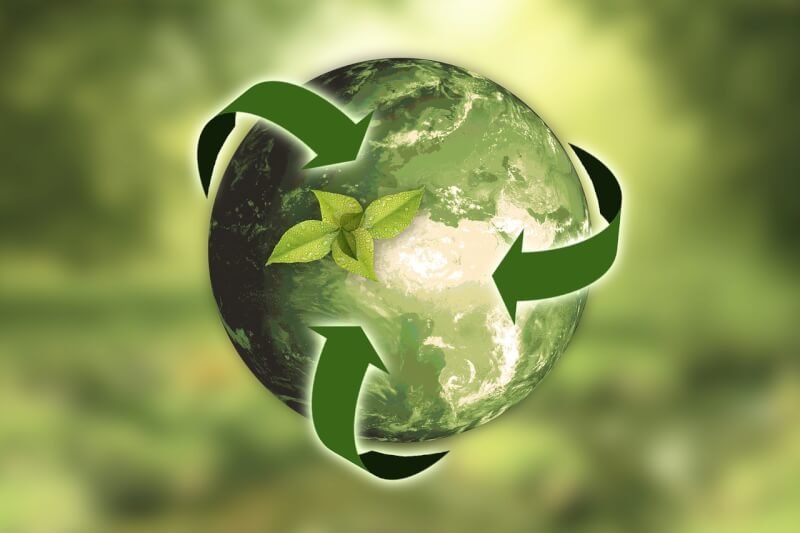Are you passionate about sustainability and looking for ways to make a positive impact in your local community? If so, you’ll be delighted to discover some creative ways to reduce waste in a coffee shop. From reusable cups to compostable packaging, this article will unveil innovative ideas that can help your favorite coffee shop minimize their ecological footprint and contribute to a greener environment. Join us as we explore simple yet impactful strategies that not only benefit the planet but also enhance the overall coffee shop experience. So, grab your cup of joe, and let’s embark on this eco-friendly journey together.

Reusable Cups and Containers
Offer Discounts for Customers Bringing their Own Cups
One of the most effective ways to reduce waste in a coffee shop is to encourage customers to bring their own cups. By offering discounts for customers who bring their own cups, you not only incentivize them to make a sustainable choice but also contribute to the reduction of disposable cup waste. This simple initiative can have a significant impact on waste reduction and promote a more eco-friendly coffee shop culture.
Sell Reusable Coffee Cups with your Branding
Another great way to promote sustainability in your coffee shop is by selling reusable coffee cups with your branding. By offering reusable cups that customers can purchase and use time and time again, you not only provide them with a sustainable option but also advertise your brand in an environmentally friendly way. Consider designing stylish and high-quality reusable cups that customers will love using, and make them readily available for purchase in your coffee shop.
Provide Reusable Containers for Take-Out Food
In addition to reusable cups, it’s important to consider the environmental impact of take-out food packaging. To reduce waste in this area, provide reusable containers for customers who order take-out food. By offering durable, food-safe containers that customers can return and reuse, you eliminate the need for disposable take-out containers and contribute to a more sustainable food service industry.
Implement a Cup Rental Program
For customers who may not have their own cups or prefer not to make a purchase, consider implementing a cup rental program. This innovative approach allows customers to rent a reusable cup for a small fee and return it after use. This not only reduces waste but also provides a convenient option for customers who want to enjoy their coffee on the go without contributing to the landfill problem. Remember to sanitize and thoroughly clean the rented cups to ensure customer satisfaction and hygiene.
Sustainable Packaging
Use Biodegradable or Compostable Coffee Cups and Lids
When it comes to coffee shop waste reduction, opting for biodegradable or compostable coffee cups and lids is a game-changer. These eco-friendly alternatives are made from renewable resources and break down naturally over time, significantly reducing their environmental impact. By choosing such packaging options, you can show your commitment to sustainability while still ensuring that your customers can enjoy their favorite hot beverages guilt-free.
Replace Plastic Straws with Eco-Friendly Alternatives
Plastic straws are one of the most notorious culprits when it comes to environmental pollution. To combat this issue, replace plastic straws with eco-friendly alternatives such as paper, bamboo, or even reusable metal straws. Not only will this minimize the waste generated by your coffee shop, but it will also demonstrate your dedication to protecting the environment and encourage customers to make eco-conscious choices.
Opt for Sustainable To-Go Food Packaging
When it comes to packaging food for take-out, opt for sustainable alternatives to traditional plastic containers and wraps. Look for packaging options made from plant-based materials, such as compostable or biodegradable bags and boxes. By prioritizing sustainable to-go food packaging, you can contribute to the reduction of plastic waste and ensure that your coffee shop aligns with the values of environmentally conscious customers.
Offer Customers the Option to Skip Packaging or Bring their Own
To further minimize packaging waste, offer customers the option to skip packaging altogether or bring their own containers. Many customers may be dining in or have their own preferred containers, so it’s important to accommodate these preferences. By encouraging customers to bring their own containers or simply enjoy their food and drinks without additional packaging, you can significantly reduce the amount of waste generated by your coffee shop.
Food Waste Management
Implement a Food Donation Program
Food waste is a significant issue in the food service industry, but there are ways to mitigate its impact. Consider implementing a food donation program in your coffee shop, where excess food that is still safe for consumption can be donated to local food banks or charities. This not only helps those in need but also reduces the amount of food that goes to waste. Partnering with local organizations and coordinating regular food donations can be a meaningful way to give back to the community and reduce food waste simultaneously.
Use Leftover Food for Specials or Limited Edition Products
Instead of letting leftover food go to waste, get creative and find ways to incorporate it into your menu. Use leftover ingredients to create daily specials or limited edition products that customers can enjoy. This not only reduces food waste but also adds a unique touch to your coffee shop’s offerings. By showcasing your commitment to sustainability through creative menu options, you can attract eco-conscious customers who appreciate your efforts to reduce waste.
Educate Staff on Proper Portioning and Minimize Waste During Food Preparation
Proper portioning and waste minimization during food preparation are essential in reducing both food waste and costs. Educate your staff on the importance of portion control to ensure that food is not wasted unnecessarily. Train them to use precise measurements and techniques that minimize waste while still maintaining the high quality of your food offerings. By instilling these practices in your team, you can significantly reduce food waste and operate your coffee shop more efficiently.
Compost Organic Waste
Composting is an effective waste management solution that can significantly reduce the amount of organic waste produced by your coffee shop. Establish a composting program where any food scraps or organic waste, such as coffee grounds and filters, can be collected and composted. This not only helps divert waste from landfills but also creates nutrient-rich compost that can be used to enrich soil or even donated to local community gardens. By composting organic waste, you close the loop on your coffee shop’s waste management process and contribute to a circular economy.
Recycling Stations
Install Clearly Labeled Recycling Bins
To encourage proper recycling practices, make it easy for your customers and staff to recycle by installing clearly labeled recycling bins throughout your coffee shop. Place them in easily accessible areas, such as near trash bins or near the entrance, to increase visibility and convenience. Clearly indicate which items should be placed in each bin, such as paper, plastic, or metal, to minimize contamination and ensure that the items can be properly recycled.
Offer Recycling for Coffee Pods and K-Cups
If your coffee shop offers single-serve coffee options using pods or K-Cups, it’s important to provide recycling options for these items. Many of these single-serve coffee containers are made from materials that can be recycled, but they often end up in landfill due to lack of awareness or infrastructure. Set up a dedicated recycling station specifically for coffee pods and K-Cups, or partner with a recycling company that specializes in recycling these items. By providing this service, you give your customers the opportunity to enjoy their favorite coffee while also minimizing the environmental impact.
Collect and Recycle Plastic Milk Jugs
If your coffee shop uses plastic milk jugs for coffee additives, it’s crucial to properly recycle them. Educate your staff on the importance of recycling plastic milk jugs, and clearly designate a collection area for them in your coffee shop. Offer instructions or signage to inform customers about the recycling process for these items. By actively promoting the recycling of plastic milk jugs, you contribute to reducing plastic waste and demonstrate your commitment to sustainability.
Partner with a Local Recycling Center or Waste Management Company
To ensure that your coffee shop’s waste is properly managed, consider partnering with a local recycling center or waste management company. They can provide guidance and expertise on waste separation, recycling techniques, and best practices. Establishing a partnership with a professional organization in the waste management industry can help streamline your coffee shop’s recycling efforts and ensure that your waste is being handled in the most sustainable and responsible way possible.

Energy-Efficient Solutions
Switch to Energy Star Rated Appliances and Equipment
Energy-efficient appliances and equipment play a significant role in reducing energy consumption in a coffee shop. Look for appliances and equipment that are Energy Star rated, as they meet strict energy efficiency guidelines set by the U.S. Environmental Protection Agency. By making this switch in your coffee shop, you can greatly reduce your electricity usage and lower your carbon footprint while still enjoying the functionality and reliability of high-quality equipment.
Install LED Lighting to Reduce Energy Consumption
Another effective energy-saving measure is to replace traditional lighting with LED (Light Emitting Diode) lighting. LED lights are highly energy-efficient, consuming significantly less electricity compared to traditional incandescent or fluorescent lights. By installing LED lighting throughout your coffee shop, you can reduce your energy consumption, extend the lifespan of your light bulbs, and lower your electricity bills. Additionally, LED lights emit a warm and inviting glow, enhancing the overall ambiance of your coffee shop.
Optimize Heating and Cooling Systems for Efficiency
Heating and cooling systems often account for a significant portion of a coffee shop’s energy usage. To minimize energy waste, optimize these systems for efficiency. Consider installing programmable thermostats to regulate temperatures during different hours of the day, ensuring that heating or cooling is only active when necessary. Proper insulation and regular maintenance of HVAC equipment are additional measures that can contribute to energy savings. By implementing these energy-efficient solutions, you can significantly reduce your coffee shop’s energy consumption and operating costs over time.
Implement Timers or Smart Controls for Lighting and Appliances
To further maximize energy efficiency, implement timers or smart controls for lighting and appliances in your coffee shop. Timers can be set to automatically turn off lights and equipment when not in use, reducing unnecessary energy consumption. Smart controls, such as motion sensors for lighting, can detect when an area is unoccupied and adjust lighting accordingly. By incorporating these technologies into your coffee shop’s infrastructure, you can optimize energy usage and reduce waste without sacrificing comfort or convenience.
Water Conservation
Install Faucet Aerators and Low-Flow Water Fixtures
Water conservation is a vital aspect of sustainability in any coffee shop. Install faucet aerators and low-flow water fixtures to reduce the amount of water used during routine tasks such as handwashing or dishwashing. Faucet aerators add air to the water flow, maintaining the same perceived water pressure while reducing water consumption. Low-flow water fixtures, such as toilets and sinks, help minimize unnecessary water usage. By making these simple adjustments, you can make a significant impact on water conservation and contribute to a more sustainable coffee shop environment.
Train Staff on Water-Saving Practices
It’s essential to train your staff on water-saving practices to ensure that efficient water usage becomes ingrained in daily operations. Educate them about the importance of conserving water and provide them with practical tips and techniques for minimizing water waste. Encourage them to turn off faucets when not in use, use appropriate water levels when filling sinks or containers, and report any leaks or issues promptly. By promoting a culture of water conservation among your staff, you can collectively work towards a more sustainable coffee shop.
Optimize Dishwashing Processes to Minimize Water Usage
Dishwashing can be a significant source of water waste in a coffee shop. To minimize water usage in this area, optimize your dishwashing processes. Consider using commercial dishwashers that are designed to be water-efficient and energy-saving. Train your staff on proper loading techniques to maximize capacity and reduce the number of cycles required. By implementing efficient dishwashing practices, you can minimize water waste without compromising on cleanliness and hygiene.
Collect and Reuse Water for Plant Watering or Cleaning
To further conserve water, consider collecting and reusing water for non-drinking purposes such as plant watering or cleaning. Install rainwater collection systems or set up designated containers to capture excess water from various sources, such as ice melting or routine cleaning processes. This collected water can then be used for tasks that do not require potable water. By reusing water in this way, you not only conserve a precious resource but also demonstrate your commitment to sustainability to both your customers and the community.

Eco-Friendly Cleaners
Switch to Non-Toxic and Biodegradable Cleaning Products
Cleaning products can have a significant impact on both human health and the environment. Switching to non-toxic and biodegradable cleaning products is a simple yet effective way to ensure that your coffee shop remains clean without harming the planet. Look for cleaning products that are certified environmentally friendly and use natural ingredients. Avoid harsh chemicals whenever possible and opt for alternatives that are safe for both your staff and the environment. By making this switch, you can create a healthier and more sustainable work environment.
Use Reusable Cleaning Cloths instead of Disposable Wipes
Another eco-friendly cleaning practice is to use reusable cleaning cloths instead of disposable wipes. Disposable wipes contribute to significant waste generation and often contain plastics that do not fully break down. By using reusable cloths that can be washed and reused, you reduce waste and minimize your coffee shop’s environmental footprint. Consider providing your staff with a task-specific set of reusable cloths and establish a system for laundering and maintaining their cleanliness.
Implement Proper Waste Disposal for Cleaning Chemicals
Proper waste disposal for cleaning chemicals is essential for protecting both human health and the environment. Ensure that your coffee shop follows all local regulations and guidelines when it comes to disposing of cleaning chemicals. Establish a system for collecting and separating cleaning chemical waste, and partner with a licensed waste management company to ensure its safe disposal. By prioritizing proper waste disposal for cleaning chemicals, you can prevent environmental contamination and demonstrate your commitment to responsible business practices.
Encourage Staff to Follow Environmentally Friendly Cleaning Practices
In addition to using eco-friendly cleaning products and tools, encourage your staff to follow environmentally friendly cleaning practices. Train them on efficient cleaning techniques that minimize water and chemical usage. Emphasize the importance of turning off equipment and lights when not in use to conserve energy. By instilling a sense of environmental responsibility in your staff, you can create a culture of sustainability that extends beyond cleaning practices and permeates every aspect of your coffee shop’s operations.
Green Building Materials
Use Sustainable and Recycled Materials for Renovations or Remodeling
If you’re planning renovations or remodeling for your coffee shop, consider using sustainable and recycled materials. Choose materials that are ethically sourced, produced with minimal environmental impact, and preferably have certifications from recognized sustainability organizations. Look for options such as reclaimed wood, recycled metal, or bamboo for flooring, counters, and furniture. By using green building materials, you contribute to the circular economy and reduce the demand for new resources.
Install Energy-Efficient Windows and Insulation
One of the significant contributors to energy waste is poorly insulated buildings. Ensure that your coffee shop is well-insulated by installing energy-efficient windows and insulation. Energy-efficient windows, such as double-pane or low-emissivity windows, prevent heat transfer and reduce the need for excessive heating or cooling. Adequate insulation in walls and roofs helps maintain a comfortable interior temperature and reduces reliance on HVAC systems. By investing in these features, you can lower your coffee shop’s energy consumption and create a more sustainable building.
Incorporate Natural or Eco-Friendly Materials in Furniture and Decor
When selecting furniture and decor for your coffee shop, consider incorporating natural or eco-friendly materials. Use reclaimed or sustainably sourced wood for tables, chairs, and wall accents. Opt for fabrics made from organic or recycled materials for upholstery and cushions. Choose plant-based paints or finishes for walls, floors, and furniture surfaces. By incorporating natural and eco-friendly materials, you enhance the aesthetic appeal of your coffee shop while minimizing its environmental impact.
Seek LEED Certification for the Coffee Shop
If you want to demonstrate your coffee shop’s commitment to sustainability, consider seeking LEED (Leadership in Energy and Environmental Design) certification. LEED is a globally recognized green building certification program that evaluates building design, construction, and operation based on various sustainability criteria. It provides a framework for implementing green building practices, including energy efficiency, water conservation, waste reduction, and indoor environmental quality. By achieving LEED certification, you not only set a high standard for sustainability but also differentiate your coffee shop in a competitive market.

Sustainable Coffee Sourcing
Partner with Fair Trade or Organic Certified Coffee Suppliers
Sustainable coffee sourcing is paramount for any coffee shop striving to reduce its environmental impact. Partner with fair trade or organic certified coffee suppliers to ensure that the coffee beans you serve are sourced in an ethical and eco-friendly manner. Fair trade certification ensures that the farmers are paid fair wages, and organic certification guarantees that the coffee is grown without harmful pesticides or synthetic fertilizers. By sourcing coffee from reputable suppliers, you support sustainable farming practices and provide your customers with a guilt-free cup of coffee.
Support Local Coffee Farmers and Sustainable Farming Practices
In addition to fair trade and organic certifications, consider supporting local coffee farmers who practice sustainable farming methods. Local sourcing not only reduces the carbon footprint associated with transportation but also supports the local economy. Seek out coffee beans that are grown using shade-grown or agroforestry techniques, as these farming practices promote biodiversity and soil health. By fostering relationships with local coffee farmers and prioritizing sustainable farming practices, you contribute to the preservation of diverse ecosystems and promote a more sustainable coffee industry.
Offer a Selection of Direct Trade or Single-Origin Coffee
Direct trade and single-origin coffee offer customers a unique and sustainable coffee experience. Direct trade involves establishing a direct relationship with coffee farmers, ensuring fair compensation and transparency throughout the supply chain. Single-origin coffee refers to coffee beans sourced from a specific region, highlighting the unique flavor profile and promoting traceability. By offering these options in your coffee shop, you not only provide customers with a more discerning choice but also support sustainable coffee production and promote transparency in the industry.
Educate Customers on the Importance of Sustainable Coffee Sourcing
Educating customers about the importance of sustainable coffee sourcing is crucial to raising awareness and promoting conscious consumption. Display information or signage in your coffee shop about your commitment to sustainable coffee sourcing and the positive impact it has on coffee farmers and the environment. Train your staff to communicate this message effectively, highlighting the stories behind the coffee beans and the positive change their purchasing decisions can make. By educating customers, you empower them to make more sustainable choices and become advocates for ethical coffee production.
Community Engagement and Education
Host Workshops or Events on Reducing Waste and Sustainable Living
Engage with your local community by hosting workshops or events on reducing waste and sustainable living. Offer informative sessions on composting, recycling, or even DIY eco-friendly coffee-related projects. Collaborate with local experts or organizations to provide valuable knowledge and practical tips. These events not only foster a sense of community but also empower individuals to make sustainable choices in their daily lives. By establishing your coffee shop as a hub for sustainability education, you can position yourself as a leader in the local eco-conscious movement.
Collaborate with Local Environmental Organizations
Forge partnerships with local environmental organizations to strengthen your coffee shop’s commitment to sustainability. Collaborate on initiatives or co-host events that align with your shared goals. For example, you could support a beach cleanup organized by a local environmental organization or participate in tree planting activities. By working together, you amplify the impact of your individual efforts and contribute to a more resilient and environmentally conscious community.
Offer Educational Materials or Signage in the Coffee Shop
Make sustainability education accessible to your customers by offering educational materials or signage in your coffee shop. Display infographics or posters that provide information on waste reduction, recycling guidelines, or the environmental benefits of sustainable coffee sourcing. Offer brochures or pamphlets with more in-depth information that customers can take home and share with others. By providing these resources, you empower your customers to learn and engage with sustainability topics beyond their coffee shop experience.
Engage with Customers on Social Media to Promote Sustainable Practices
Utilize social media platforms to engage with your customers and promote sustainable practices. Share tips and information on waste reduction, energy conservation, or sustainable coffee farming through social media posts or stories. Encourage your followers to share their own eco-friendly habits or experiences, fostering a sense of community and collective action. By leveraging the power of social media, you can reach a wider audience and inspire positive change beyond the physical walls of your coffee shop.
In conclusion, there are numerous creative ways to reduce waste in a coffee shop and promote sustainability. By implementing initiatives such as offering discounts for customers bringing their own cups, using biodegradable packaging, managing food waste, recycling, embracing energy-efficient solutions, conserving water, using eco-friendly cleaners, incorporating green building materials, sourcing sustainable coffee, and engaging with the community through education, coffee shop owners can make a significant positive impact on the environment. By adopting these practices, a coffee shop can not only reduce its environmental footprint but also inspire and educate customers, contributing to a more sustainable and eco-conscious society.



